新编英语教程(第三版) Unit6练习册答案
新编英语教程6练习与答案
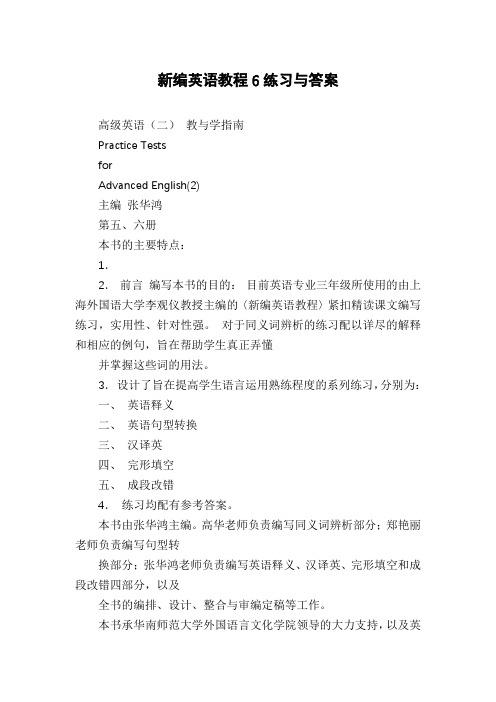
新编英语教程6练习与答案高级英语(二)教与学指南Practice TestsforAdvanced English(2)主编张华鸿第五、六册本书的主要特点:1.2.前言编写本书的目的:目前英语专业三年级所使用的由上海外国语大学李观仪教授主编的〈新编英语教程〉紧扣精读课文编写练习,实用性、针对性强。
对于同义词辨析的练习配以详尽的解释和相应的例句,旨在帮助学生真正弄懂并掌握这些词的用法。
3.设计了旨在提高学生语言运用熟练程度的系列练习,分别为:一、英语释义二、英语句型转换三、汉译英四、完形填空五、成段改错4.练习均配有参考答案。
本书由张华鸿主编。
高华老师负责编写同义词辨析部分;郑艳丽老师负责编写句型转换部分;张华鸿老师负责编写英语释义、汉译英、完形填空和成段改错四部分,以及全书的编排、设计、整合与审编定稿等工作。
本书承华南师范大学外国语言文化学院领导的大力支持,以及英语系高年级教研室全体同仁的热心帮助,编者在此表示衷心的感谢。
编者2021年1月于华南师范大学外文学院ContentsUnit One: *****S ERUPTSUnit Two: THE FINE ART OF ***** THINGS OFFUnit Three: WALLS AND *****SUnit Four: THE LADY,OR THE TIGER?Unit Five: THE LADY,OR THE TIGER?Unit Six: DULL WORKUnit Seven: BEAUTYUnit Eight: *****EUnit Nine: A RED LIGHT FOR *****WSUnit Ten: *****T-A *****ACYUnit Eleven: ON *****ING *****IPTS TOFLOPPY DISCS AND *****S TO *****NUnit Twelve: GRANT AND LEEUnit Thirteen: *****SMUnit Fourteen: THAT *****ING *****---NATUREUnit Fifteen: *****G AS **********3 16 28 40 53 65 74 84 98 114 131 147 163 175 191TEXT I Unit One*****S ERUPTSI. Paraphrase the parts underlined in the following:So the letter which you asked me to write on my uncle s death has made you eager tohear about the terrors and also the hazards I had to face 12I took a bath, dined, and then dozed 3had been earth 4Campania: but that night the shocks were so violent that everything fell as if it were notonly shaken but overturned.I don t know whether I should call this courage or 5on my part (I was onlyseventeen at the time) but I 6 and went on reading as if I hadnothing else to do.Up came a friend of my uncle s who had just come from Spain to join him. When hesaw us sitting there and me actually reading, he scolded us both ―me for my 7and my mother for allowing it.By now it was dawn [25 August in the year 79], but the light was still dim and 8The buildings round us were already 9and the open space we were in was toosmall for us not to be in real and 10danger if the house collapsed. This finally 11to leave the town. We were followed by a panic- stricken mob of peoplewanting to act on someone else s decision 12looks like 13who 14in a densecrowd.We also saw the sea sucked away and apparently forced back by the earthquake: at anyrate it receded from the shore so that 1516sand. On the landward side a fearful black cloud was 17of flame, and parted to reveal great tongues of fire, like flashes of lightning magnified insize.At this point my uncle s friend from Spain 18still more urgently: “If yourbrother, if your uncle is still alive, he will want you both to be saved; if he is dead, he wouldwant you to survive him so why put off your escape?”Soon afterwards the cloud sank down to earth and covered the sea; it had already 19Capri and hidden the promontory of Misenum from sight. Then my mother 20I looked round: a dense black cloud was coming up behind us, spreading over the earthlike a flood. “Let us leave the road while we can still see,” I said, “or we shall be knockeddown and 21in the dark by the crowd behind.”You could hear the shrieks of women, the 22some were calling their parents, others their children or their wives, trying to recognize them by their voices. People 23were some who 2425gods, but still more imagined there were no gods left, and that the universe was plungedinto eternal darkness forevermore. There were people, too, who 26inventing 27part was on fire, and though their tales were false they found others to believe them. A 28than daylight.I could boast that not a groan or cry of fear 2930dying with me and I with it.We returned to Misenum where we 31and then spent an anxious night alternating between hope and fear.II. Rewrite the followingFor each of the sentences below, write a new sentence as close in meaning as possible to1. We were followed by a panic-stricken mob of people wanting to act on someone else sdecision in preference to their own, who hurried us on our wayby pressing hard behindin a dense crowd.2. We replied that we would not think of considering our own safety as long as we wereuncertain of his.3. There were people, too, who added to the real perils by inventing fictitious dangers: somereported that part of Misenum had collapsed or another part was on fire, and though theirtales were false they found others to believe them.4. I could boast that not a groan or cry of fear escaped me in these perils, had I not derivedsome poor consolation in my mortal lot from the belief that the whole world was dyingwith me and I with it.5. Several hysterical individuals made their own and other people s calamities seemludicrous in comparison with their frightful predictions.Compared with several individuals frightful predictions, the calamities____________III. Translate the following into English1. 还未等我们坐下来喘息,夜幕已经降临,这黑暗使你觉得不是在无月色或多云的夜晚,而像是在灯火熄灭的紧闭的房间里。
李观仪《新编英语教程》(第3版)(课文精解 Unit 6)【圣才出品】

四、课文精解Dialogue1.I guess many faces ware beyond recognition after so many years:介词beyond 意为“超过;越过”,beyond recognition即“超出了辨认的能力”,也就是“认不出来”。
类似的还有:beyond understanding超出理解的范围,摸不着头脑;beyond one’s control超出了某人的控制范围。
2.We should try our best to avoid seeing only the negative side of things by counting our blessings,not our curses:“blessing”即“幸事,福祉”,curse即“诅咒,祸害”。
count one’s blessings指让某人感念自己有多幸运,要知足、珍惜。
3.Now my electric wheelchair is in a semi-retired condition:in…condition即“处于……的状态”,如:be in good condition状态很好;be in bad condition状态很差。
“semi-retired”即“半退休的”,前缀semi-表示“半;部分”,一般用于形容词和名词前构成其他形容词和名词,如:semi-skilled半熟练的;semi-automation半自动化;semi-formal半正式的Reading I1.…so childishly demanding that we can hardly put up with her:put up with sb“忍受,容忍某人”,例:I don’t know how she puts up with his cruelty to her.我不明白她怎么能忍受他的虐待。
新编大学英语(第三版)综合教程课后习题答案
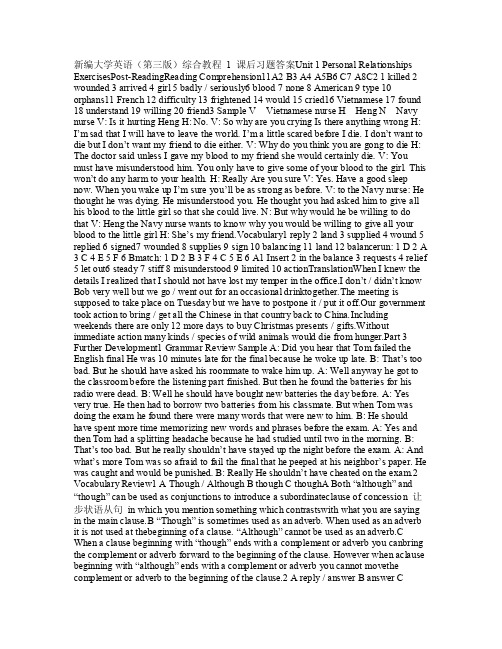
新编大学英语(第三版)综合教程1 课后习题答案Unit 1 Personal Relationships ExercisesPost-ReadingReading Comprehension11A2 B3 A4 A5B6 C7 A8C2 1 killed 2 wounded 3 arrived 4 girl 5 badly / seriously6 blood 7 none 8 American 9 type 10 orphans11 French 12 difficulty 13 frightened 14 would 15 cried16 Vietnamese 17 found 18 understand 19 willing 20 friend3 Sample V Vietnamese nurse H Heng N Navy nurse V: Is it hurting Heng H: No. V: So why are you crying Is there anything wrong H: I’m sad that I will have to leave the world. I’m a little scared before I die. I don’t want to die but I don’t want my friend to die either. V: Why do you think you are gong to die H: The doctor said unless I gave my blood to my friend she would certainly die. V: You must have misunderstood him. You only have to give some of your blood to the girl. This won’t do any harm to your health. H: Really Are you sure V: Yes. Have a good sleep now. When you wake up I’m sure you’ll be as strong as before. V: to the Navy nurse: He thought he was dying. He misunderstood you. He thought you had asked him to give all his blood to the little girl so that she could live. N: But why would he be willing to do that V: Heng the Navy nurse wants to know why you would be willing to give all yourbl ood to the little girl H: She’s my friend.Vocabulary1 reply 2 land 3 supplied 4 wound 5 replied 6 signed7 wounded 8 supplies 9 sign 10 balancing 11 land 12 balancerun: 1 D 2 A 3 C 4 E 5 F 6 Bmatch: 1 D 2 B 3 F 4 C 5 E 6 A1 Insert 2 in the balance 3 requests 4 relief 5 let out6 steady 7 stiff 8 misunderstood 9 limited 10 actionTranslationWhen I knew the details I realized that I should not have lost my temper in the office.I don’t / didn’t know Bob very well but we go / went out for an occasional drinktogether.The meeting is supposed to take place on Tuesday but we have to postpone it / put it off.Our government took action to bring / get all the Chinese in that country back to China.Including weekends there are only 12 more days to buy Christmas presents / gifts.Without immediate action many kinds / species of wild animals would die from hunger.Part 3 Further Development1 Grammar Review Sample A: Did you hear that Tom failed the English final He was 10 minutes late for the final because he woke up late. B: Th at’s too bad. But he should have asked his roommate to wake him up. A: Well anyway he got to the classroom before the listening part finished. But then he found the batteries for his radio were dead. B: Well he should have bought new batteries the day before. A: Yes very true. He then had to borrow two batteries from his classmate. But when Tom was doing the exam he found there were many words that were new to him. B: He should have spent more time memorizing new words and phrases before the exam. A: Yes and then Tom had a splitting headache because he had studied until two in the morning. B: That’s too bad. But he really shouldn’t have stayed up the night before the exam. A: And what’s more Tom was so afraid to fail the final that he peeped at his neighbor’s paper. He was caught and would be punished. B: Really He shouldn’t have cheated on the exam.2 Vocabulary Review1 A Though / Although B though C thoughA Both “although” and “though” can be used as conjunctions to introduce a subordinateclause of concessio n 让步状语从句in which you mention something which contrastswith what you are saying in the main clause.B “Though” is sometimes used as an adverb. When used as an adverb it is not used at thebeginning of a clause. “Although” cannot be used as an adverb.C When a clause beginning with “though” ends with a complement or adverb you canbring the complement or adverb forward to the beginning of the clause. However when aclause beginning with “although” ends with a complement or adverb you cannot movethe complement or adverb to the beginning of the clause.2 A reply / answer B answer Creplying Both “answer” and “reply” can be used as nouns and verbs. With a noun object we use the verb “answer” or “reply to”. e.g. We must answer / reply to these questions as soon as possible.3 A speaks B speak C talking D speak / talk You say that someone “speaks” or “can speak” a foreign language. If someone is giving a speech you say they are “speaking”. If two or more people are having a conversation you say that they are “talking”. You do not say that they are “speaking”. If you “speak to / talk to” someone you have a conversation with them.4 A injured / hurt B hurt / injured C wounded / injured D wounds You can be “wounded” or receive a “wound” from any attack in which a gun or sharp instrument such as a sword or knife is used. You can be “hurt” or “injured” or receive an “injury” a when any other weapon such as a heavy stick or bomb is used b in an accident. Both “wound” and “injure” are more serious than “hurt”. Note that “hurt” can be used as an intransitive verb but not “wound” or “injure”. e.g. It hurts when I try to move my leg.5 A houses B apartment apartments A “house” is a building for people to live in and often has more than one level. An “apartment” in American English or a “flat” in British English refers to a set of rooms within a larger building usually on one level.6A asideB apartC aside / apart Both “aside” and “apart” can be used as adverbs. “Aside” means “away or to the side”. “Apart” means “separated by a distance”. The phrase “aside from / apart from” means a except for b in addition to.7 A requests B requested C demandedD demands Both “request” and “demand” mean “ask for sth. or ask sb. to do sth.”. “Request” is more formal and stronger than “ask for”. “Demand” i s even stronger. If you “demand” something you feel strongly that you have the right to get it and will not take “no” for an answer. Both “request” and “demand” can be used as a verb or as a noun.A “request” for something is a polite demand for it.8 A bor derB boundary The word “border” refers to the dividing line between two countries or states or the land near that line. A “boundary” is a precise line marking the outer limits of an area.3 Roommates and Friends STEP ONE Sample In addition to those listed in the book my ideal roommate would also be: someone who does not smoke a responsible and honest person someone who does not snore while sleeping the best student in my class someone who does not stay up too late an independent person someone who does not interfere in my private affairs a tolerant person a trustworthy person etc. STEP TWO Sample No I don’t think roommates are usually friends. Living in the same room doesn’t necessarily mean that friendships will develop. Although roommates are usually friendly to each other not all of them are friends because friendliness is not always an indication of friendship. It’s true with classmates. Only when people have similar interests and a common outlook on life will they become friends or close friends. I think more often than not roommates will become friends. Obviously roommates spend much time together and therefore will learn a lot about each other. When people get to know each other friendship often develops. Many people could have become friends if they had met and got together often or long enough. Sharing rooms paves the way to friendship. We often hear older people say they were roommates or classmates and therefore good friends. It doesn’t mean roommates will surely become friends. They’re more likely t o become friends.4 It Made Me Feel So Good STEP TWO Sample As a newcomer in this university the first letter I’ve received here is from my best friend Dong Ming. Dong Ming and I were classmates in high school and we spent a lot of time together studying talking and playing around. I can safely say that not a single day was spent without our being together during our senior high school years. But now we’re studying at two different universities far apart from each other. Hisletter makes me feel as if we wer e together again talking. And what’s important is not the letter itself but what he said in the letter.Dear Dong HaoI felt sad when we left each other last Friday and yet a little happy about all the newthings and the excitement ahead of usin our new coll ege life. It’s what we want andneed.One thing is very important to both of us: to make more friends and to learn to get alongwith others. To do so I believe we should respect others—their point of view their wayof doing things etc. Only in this way can we make more friends and make our campuslife more interesting. What do you think I look forward to your reply. Best Wishes Dong Ming Sometimes I feel good about myself when I’ve been able to contribute a little bit to my relationships with others. I remember what I did for Xiao Li my next door neighbor and good friend. Last summer Xiao Li got seriously ill and was in the hospital for five weeks. At the beginning I didn’t know what I could do for him. I went to Mom for advice. Mom thought about it for a while a nd said “Well the only thing I can tell you is to be available when he needs you—not when you want to be available.” I took Mom’s advice seriously. I called him on the phone now and then to check if he needed any help and I went to see him every day after school and did what I could for him. So when Xiao Li recovered and left the hospital I felt so happy.5 When Your Neighbor Is in Need of Help STEP ONE Sample A young woman was walking along the streets one night when she was attacked. She screamed for help and managed to escape. A few minutes later her attacker caught her again and she continued screaming for help while the neighbors watched terrified from their windows and did nothing. They didn’t even call the police. The woman died of multiple stab wounds 多处刺伤. STEP TWO Sample 1 I think there are several reasons for that. First people were rather cowardly and selfish. When they heard someone screaming late at night they thought that might be dangerous so they just stood back and watched the woman get killed in front of them. They preferred to protect themselves rather than get involved to risk being injured or even killed. Second they felt that there are already institutions in cities to deal with this kind of problem. They didn’t think they needed to intervene because the police would do something for them. Finally it is possible that these people were so terrified that they could not think clearly or take action to protect the woman. 2 I don’t know. Maybe I would go to the street and try to protect the woman. I think more people would come to help if they realized what was really happening. Maybe I would call the police. But I’m afraid that when the police arrived she might already have been killed. Or maybe I would be too scared to give any help. I might simply close the window and put my ear plugs in. These are the different things I might do on such an occasion but I believe it’s most likely that I would call the police.Part 4 Translation and Writing2 Translation Practice Lean on Me 依靠我吧Sometimes in our lives we all have pain we all have sorrow 生活中我们会有痛苦,会有悲伤But if we are wise we know that there’s always tomorrow. 然而,聪明的我们明白总有明天(可指望)。
新编英语教程第六册练习册paraphrase答案
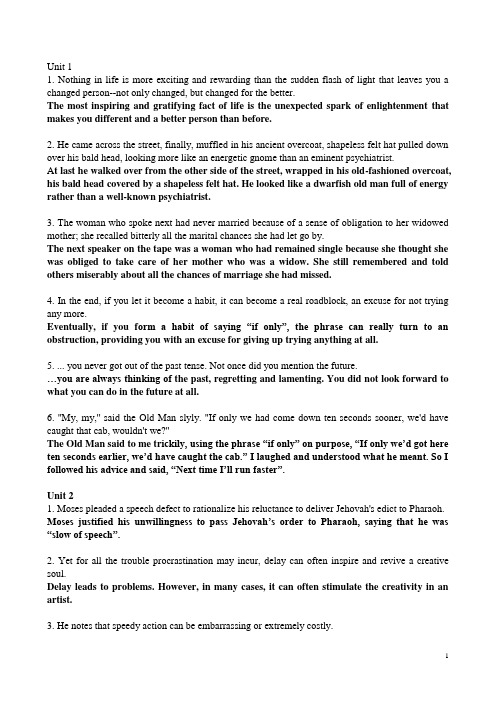
Unit 11. Nothing in life is more exciting and rewarding than the sudden flash of light that leaves you a changed person--not only changed, but changed for the better.The most inspiring and gratifying fact of life is the unexpected spark of enlightenment that makes you different and a better person than before.2. He came across the street, finally, muffled in his ancient overcoat, shapeless felt hat pulled down over his bald head, looking more like an energetic gnome than an eminent psychiatrist.A t last he walked over from the other side of the street, wrapped in his old-fashioned overcoat, his bald head covered by a shapeless felt hat. He looked like a dwarfish old man full of energy rather than a well-known psychiatrist.3. The woman who spoke next had never married because of a sense of obligation to her widowed mother; she recalled bitterly all the marital chances she had let go by.The next speaker on the tape was a woman who had remained single because she thought she was obliged to take care of her mother who was a widow. She still remembered and told others miserably about all the chances of marriage she had missed.4. In the end, if you let it become a habit, it can become a real roadblock, an excuse for not trying any more.Eventually, if you f orm a habit of saying “if only”, the phrase can really turn to an obstruction, providing you with an excuse for giving up trying anything at all.5. ... you never got out of the past tense. Not once did you mention the future.…you are always thinking of the past, regretting and lamenting. You did not look forward to what you can do in the future at all.6. ''My, my,'' said the Old Man slyly. ''If only we had come down ten seconds sooner, we'd have caught that cab, wouldn't we?''The Old Man said to me tr ickily, using the phrase “if only” on purpose, “If only we’d got here ten seconds earlier, we’d have caught the cab.” I laughed and understood what he meant. So I followed his advice and said, “Next time I’ll run faster”.Unit 21. Moses pleaded a speech defect to rationalize his reluctance to deliver Jehovah's edict to Pharaoh. Moses justified his unwillingness to pass Jehovah’s order to Pharaoh, saying that he was “slow of speech”.2. Yet for all the trouble procrastination may incur, delay can often inspire and revive a creative soul.Delay leads to problems. However, in many cases, it can often stimulate the creativity in an artist.3. He notes that speedy action can be embarrassing or extremely costly.He points out that hastiness may give rise to decision which turn out to be humiliating or expensive.4. Bureaucratization, which flourished amid the growing burdens of government and the greater complexity of society, was designed to smother policymakers in blankets of legalism, compromise and reappraisal---and thereby prevent hasty decisions from being made.Excessive red-tape(官样文章;繁文缛节) developed because public administration was expanding in scope and because society was growing more and more complicated. In this sense, red-tape helped those in charge of policy to be fully engaged in enormous amount of paperwork and judgment, thus making it impossible for an immature decision to result.5. ...many of my friends go through agonies when they face a blank page.…many of my friends have a hard time the moment they attempt to put pen to paper.Unit 31. Of course, my father is a gentleman of the old school, a member of the generation to whom a good deal of modern architecture is unnerving; but I suspect---I more than suspect, I am convinced---that his negative response was not so much to the architecture as to a violation of his concept of the nature of money.Brought up in the old tradition, my father is naturally not prepared to accept the idea of modern architecture; his objection to it, I would assume, indeed I should say I am pretty sure, is not a result of his strong dislike of the physical building itself, but rather that of his refusal to change his attitude towards money.2. If a building's design made it appear impregnable, the institution was necessarily sound, and the meaning of the heavy wall as an architectural symbol dwelt in the prevailing attitude toward money, rather than in any aesthetic theory.If a building was made to look sturdy/invulnerable, it would be accordingly regarded as reliable, and the significance of the thick walls would be measured not by their artistic value, but by their seeming ability to provide a safe location for money.3. In a primitive society, for example, men pictured the world as large, fearsome, hostile, and beyond human control.P eople in a primitive society, for example, saw the world as an enormous planet full of fear, hatred and disorder.4.The principal function of today's wall is to separate possible undesirable outside air from the controlled conditions of temperature and humidity which we have created inside.Today a wall serves mainly as a physical means to protect the desired atmosphere inside from being disturbed by anything unwelcome outside.5. To repeat, it is not our advanced technology, but our changing conceptions of ourselves in relation to the world that determine how we shall build our walls.Again, the decisive factor that can influence the design of a wall is not the advancement of science and technology, but our ever-changing attitude towards our place in this world.Unit 41. He was a man of exuberant fancy, and, withal, of an authority so irresistible that, at his will, he turned his varied fancies into facts.He was a man rich in whimsies, and intolerant of any act bold enough as to challenge his authority. When his mind caught upon something, absurd as it might be, he would do everything to make sure that it was done in the way he wished.2. When every member of his domestic and political systems moved smoothly in its appointed course, his nature was bland and genial; but whenever there was a little hitch, and some of his orbs got out of their orbits, he was blander and more genial still, for nothing pleased him so much as to make the crooked straight, and crush down uneven places.When all his subjects behaved in such a manner as they were told to, he could be gentle and kind. And he could even be more so, if anything not conforming to what he expected should occur, because that offered a great chance for him to see the undesirable removed, a thing he was most delighted in doing.3. He could open either door he pleased: he was subject to no guidance or influence but that of the aforementioned impartial and incorruptible chance.He enjoyed total freedom to choose what to do: he was not directed or influenced by anyone as to which door to open. The only thing that was decisive in terms of his fate was the above-mentioned chance, granted to all the accused alike.4. This element of uncertainty lent an interest to the occasion which it could not otherwise have attained.The fact that no one could tell for sure what might happen (to the accused) made this from of trial more attractive than any other form of justice.5. Thus the masses were entertained and pleased, and the thinking part of the community could bring no charge of unfairness against this plan; for did not the accused person have the whole matter in his own hands?Thus people enjoyed coming here to watch, and those guided by reason in the society could not possibly question the fairness of this form of trial; for was it not the fact that all the accused were given equal chances to make decisions upon their won destiny?Unit51. This semi-barbaric king had a daughter as blooming as his most florid fancies, and with a soul as fervent and imperious as his own.This semi-barbaric king had a daughter as exuberant as the wildest of his notions, a daughter who possessed a nature as fierce and tyrannical as his own.2. Of course, everybody knew that the deed with which the accused was charged had been done.It was, of course, known to all that he was guilty of the offense of conducting an affair with the princess.3. ...; but the king would not think of allowing any fact of this kind to interfere with the workings of the tribunal, in which he took such great delight and satisfaction.…,even though the ki ng was well aware that the love affair had taken place, he would still refuse to let the normal method of deciding guilt or innocence be disturbed, because he was extremely enthusiastic about his way of setting matters of this kind.4. ...; but gold, and the power of a woman's will, had brought the secret to the princess..…; but because she had the money, and above all, because her determination was so irresistible, the princess was able to get access to the secret.5. He understood her nature, and his soul was assured that she would never rest until she had made plain to herself this thing, hidden to all other lookers-on, even to the king.He knew her so well that he was perfectly positive that she would never cease to search for the secret, which remained unknown to all other spectators, even to the king himself.Unit 61. There seems to be a general assumption that brilliant people cannot stand routine; that they needa varied, exciting life in order to do their best.It is generally believed that a colorless life can freeze a creative mind, and that only a colorful life can inspire a man to creative work.2. The outstanding characteristic of man's creativeness is the ability to transmute trivial impulses into momentous consequences.One of the wonders human creativity works is that man can make full use of even insignificant feelings to produce far-reaching results.3. An eventful life exhausts rather than stimulates.A life full of diversions stops man’s creativity instead of activating it.4. It is usually the mediocre poets, writers, etc.,who go in search of stimulating events to release their creative flow.Only literary artists of an average type rely on excitements in life as a source for their creative work./ Great poets, writers, etc., create works of art out of trivial and common subject.5. People who find dull job unendurable are often dull people who do not know what to do with themselves when at leisure.People who are unable to see how to be patient with repetitious work are usually those who are unable to see where to find fun in life when it comes to relaxation.。
新编英语教程6练习册含
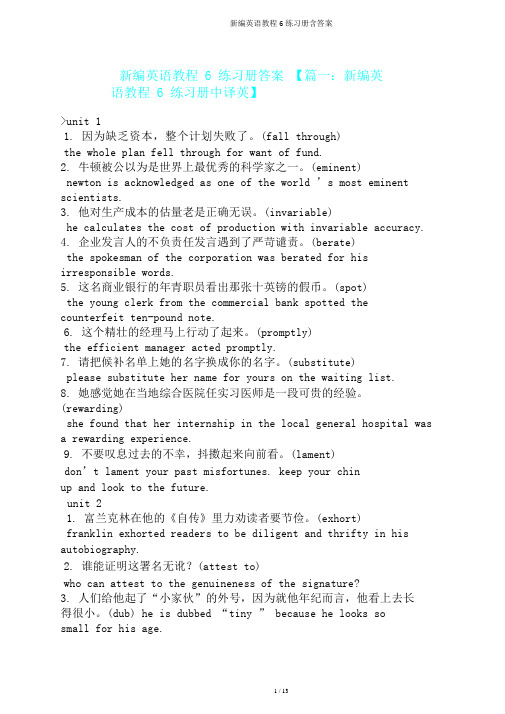
新编英语教程 6 练习册答案【篇一:新编英语教程 6 练习册中译英】>unit 11. 因为缺乏资本,整个计划失败了。
(fall through)the whole plan fell through for want of fund.2. 牛顿被公以为是世界上最优秀的科学家之一。
(eminent)newton is acknowledged as one of the world ’s most eminent scientists.3. 他对生产成本的估量老是正确无误。
(invariable)he calculates the cost of production with invariable accuracy.4. 企业发言人的不负责任发言遇到了严苛谴责。
(berate)the spokesman of the corporation was berated for his irresponsible words.5. 这名商业银行的年青职员看出那张十英镑的假币。
(spot)the young clerk from the commercial bank spotted thecounterfeit ten-pound note.6. 这个精壮的经理马上行动了起来。
(promptly)the efficient manager acted promptly.7. 请把候补名单上她的名字换成你的名字。
(substitute)please substitute her name for yours on the waiting list.8. 她感觉她在当地综合医院任实习医师是一段可贵的经验。
(rewarding)she found that her internship in the local general hospital wasa rewarding experience.9. 不要叹息过去的不幸,抖擞起来向前看。
(NEW)李观仪《新编英语教程(6)》(第3版)学习指南【词汇短语+课文精解+全文翻译+练习答案】

35. bitterly [5bitEli] adj. very; violently 强烈地;非常 bitterly upset 极其难 过
20. marital [5mAritl] adj. of a husband or wife; of marriage夫妇间的;婚姻 的
21. spot [spCt] v. pick out(one person or thing from many); catch sight of; recognize; discover辨出;认出;发觉;e.g. Vicenzo failed to spot the error. 维森佐没能发现这个错误。 n. 地点;斑点 on the spot 立刻,当 场;在危险中;处于负责地位 vt. 弄脏;e.g. His boots were spotted with mud. 他的靴子上沾有泥渍。
2. curious [5kjuEriEs] adj. eager to know r learn富于好奇心的,有求知欲 的,感兴趣的
3. fastidious [fAs5tidiEs] adj. selecting carefully; choosing only what is good挑剔的;苛求的,难取悦的;e.g. She is too fastidious about her food or clothing. 她爱讲究吃穿。
38. stiffly [5stifli] adj. stubbornly, obstinately 生硬地;顽固地;呆板地e.g. They greeted each other stiffly, without affection. 他们生硬地打着招呼,没 有一丝爱意。
新编英语教程6练习册第三版
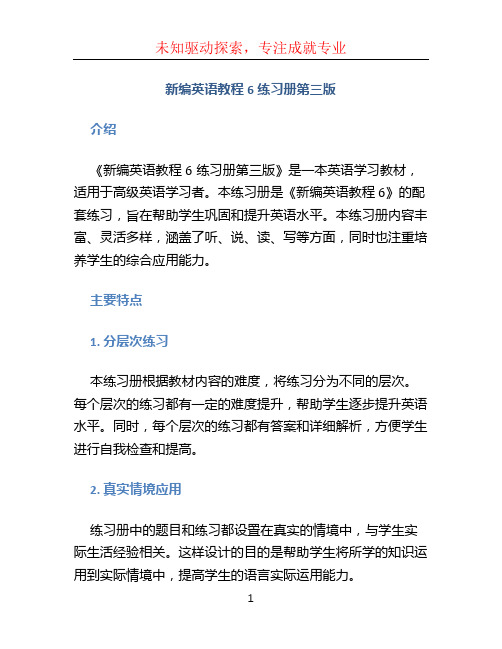
新编英语教程6练习册第三版介绍《新编英语教程6练习册第三版》是一本英语学习教材,适用于高级英语学习者。
本练习册是《新编英语教程6》的配套练习,旨在帮助学生巩固和提升英语水平。
本练习册内容丰富、灵活多样,涵盖了听、说、读、写等方面,同时也注重培养学生的综合应用能力。
主要特点1. 分层次练习本练习册根据教材内容的难度,将练习分为不同的层次。
每个层次的练习都有一定的难度提升,帮助学生逐步提升英语水平。
同时,每个层次的练习都有答案和详细解析,方便学生进行自我检查和提高。
2. 真实情境应用练习册中的题目和练习都设置在真实的情境中,与学生实际生活经验相关。
这样设计的目的是帮助学生将所学的知识运用到实际情境中,提高学生的语言实际运用能力。
3. 多样化的题型本练习册中,题型多样,涵盖了听力、口语、阅读和写作等方面的练习。
学生可以通过不同的题型进行全面复习和巩固,提高不同方面的英语能力。
章节概述第一章:听力练习本章节主要针对学生的听力能力进行练习。
通过听取不同的对话和短文,学生可以提高自己的听力理解能力。
同时,本章节还提供了与听力材料相关的练习题目,帮助学生巩固所听到的内容。
第二章:口语练习该章节旨在训练学生的口语表达能力。
通过模拟真实情境,学生可以进行口语练习,并运用所学的语法和词汇进行表达。
同时,本章节还提供了一些常用口语练习题目,帮助学生提高英语口语交流能力。
第三章:阅读理解本章节注重提高学生的阅读理解能力。
通过阅读不同类型的文章,学生可以提高自己的阅读速度和理解能力。
同时,本章节还提供了相关的练习题目,帮助学生巩固所学的阅读内容。
第四章:写作练习该章节旨在训练学生的写作能力。
通过指定的写作题目,学生可以练习写作,提高自己的写作技巧。
同时,本章节还提供了写作范文和评析,帮助学生改进写作水平。
使用方法学生可以根据自己的英语水平选择对应的章节进行练习。
建议学生按照章节顺序进行练习,这样可以逐步提高英语能力。
同时,学生还可以根据自己的需要选择特定的练习题进行训练。
新编大学英语第三版综合教程第三册答案
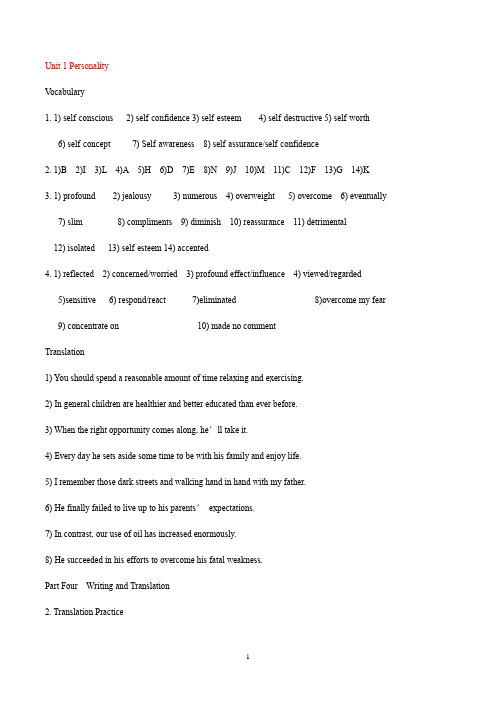
Unit 1 PersonalityV ocabulary1. 1) self-conscious 2) self-confidence 3) self-esteem 4) self-destructive 5) self-worth6) self-concept 7) Self-awareness 8) self-assurance/self-confidence2. 1)B 2)I 3)L 4)A 5)H 6)D 7)E 8)N 9)J 10)M 11)C 12)F 13)G 14)K3. 1) profound 2) jealousy 3) numerous 4) overweight 5) overcome 6) eventually7) slim 8) compliments 9) diminish 10) reassurance 11) detrimental12) isolated 13) self-esteem 14) accented4. 1) reflected 2) concerned/worried 3) profound effect/influence 4) viewed/regarded5)sensitive 6) respond/react 7)eliminated 8)overcome my fear9) concentrate on 10) made no commentTranslation1) You should spend a reasonable amount of time relaxing and exercising.2) In general children are healthier and better educated than ever before.3) When the right opportunity comes along, he’ll take it.4) Every day he sets aside some time to be with his family and enjoy life.5) I remember those dark streets and walking hand in hand with my father.6) He finally failed to live up to his parents’expectations.7) In contrast, our use of oil has increased enormously.8) He succeeded in his efforts to overcome his fatal weakness.Part Four Writing and Translation2. Translation Practice1) It is believed that pessimism often leads to hopelessness, sickness and failure.2) Optimism, by contrast, can make you happy, healthy and successful.3) When you fail in something, profit from the failure as a learning experience.4) Think about your strengths and build up self-confidence in front of problems or difficulties.5) Don’t let negative thoughts hold you back.6) Everyone has experienced failures and disappointments, so don’t blame yourself too much.Unit 2 Myths and LegendsV ocabulary1. 1) A. invitation B. invited C. inviting 2) A. prepare B. prepared C. preparation D.preparatory/preparation3) A. discoveries B. discoverers C. discovered4) A. approval B. approve C. approved D. approving E. disapprove5) A. eloquent B. eloquence C. eloquently6) A. faithful B. unfaithful/faithless C. faith d. faithfully7) A. occasional B. occasionally C. occasion8) A. delivery B. delivering C. delivered9) A. troublesome B. troubled C. troubled D. troubling 10) A. assurance B. assured C. assure2. 1) got/ran into trouble 2) no trouble 3) asking for trouble 4) have …trouble 5) troublewith6) in serious/deep/big trouble 7) get/getting …into trouble 8) took the trouble3. 1) with a pattern of roses 2) prepared a wonderful/goof meal for us3) promised faithfully 4) deliver this letter5) a selection of milk and plain chocolate 6) keep out of mischief/behave themselves7) the sound of distant thunder 8) received approval from the government9) in spite of the fact that he drank too much 10) agree whether the drug is safe or notPart Three Further Development5. Complete the following Ancient Chinese story by translating the Chinese into English1) the true reason why there was no such animal in Guizhou2) they were of no use at all in this place3) when he saw the donkey all of a sudden, he thought it was a monster4) he hid himself in the trees while looking at the donkey5) what kind of animal is this and why does it look different from other animals that I’ve seen?6) But one day the donkey stretched its thin neck and cried7) the tiger discovered that the donkey didn’t have any other skills besides crying8) But he dared not rush to it and eat it just as he did to other animals9) This did irritate the donkey (made the donkey angry), who raised its hind leg and kicked thetiger10) This time he rushed to it without hesitation and bit its rhroatPart Four Writing and Translation2. Translation Practice万物之初天地还是一体充满混沌。
- 1、下载文档前请自行甄别文档内容的完整性,平台不提供额外的编辑、内容补充、找答案等附加服务。
- 2、"仅部分预览"的文档,不可在线预览部分如存在完整性等问题,可反馈申请退款(可完整预览的文档不适用该条件!)。
- 3、如文档侵犯您的权益,请联系客服反馈,我们会尽快为您处理(人工客服工作时间:9:00-18:30)。
Reference for Unit 6 workbook exercises
Blank Filling
A.
1. changed, promising
2. coming, qualified
3. determined
4. spoken, leading, surprising
5. frightening
6. demanding
7. pleased, soiled
8. complicated
9. interested, exciting, soaked
10. t iring, tired
B.
1. giving
2. Fascinated, rising / rise
3. singing, to do, making
4. keeping, playing, to be, to see, climbing
5. opening
6. to take, shopping, doing, to do
7. to have remembered, to tell, preparing, to do
8. to watch, to read, reading, watching
9. missing, to tell
10. t o be taken
11. s wimming, cleaning, to do
12. w aiting, seeing, missing, to find, to be
C.
1. for
2. to
3. of
4. on
5. read
6. across
7. about / for 8. in
9. until / till
10. o pinion
11. b y
12. k eep
13. e xcellent
14. t ime
15. p leasure
16. f rom
17. y ourself
18. i n
19. f illed
20. t rains
21. b ut
22. m eeting
23. t hings
24. a ttitude
25. f or
D.
1. speaking
2. before
3. by
4. few
5. developed
6. how
7. writing 8. step
9. or
10. o f
11. f ound
12. f rom
13. i deas
14. u sed
15. t he
16. f irst
17. r epresent
18. c an
19. l anguage
20. m aking
21. w orld
22. t o
23. o f
24. o nly
25. w ay
VI. Sentence Rewriting
A.
1. Whenever he … bookshop, he …away from it.
2. Whoever he is, he … law.
3. Wherever he went, poor … life.
4. Whatever you may say, I … thi ng.
5. However hard he tries, he … satisfactorily
6. Don’t …, whoever repeats it. / Whoever repeats it, don’t…
7. However annoying his behavior is / may be, we … him.
8. Whatever he … say, I … going.
9. Keep calm, whatever happens. / Whatever happens, keep …
10. T he boy…, wherever he is. / Wherever …, the boy…
B.
1. To his great joy, his uncle … present.
2. Much to our relief, the plane … last.
3. To the surprise of the teacher, yang Ling had … heart.
4. To our grief, Professor Hu died of cancer last week.
5. To my satisfaction, his statement is correct.
6. To the disappointment of the students, the book … bookshops.
7. To their indignation, John was unfairly dismissed.。
